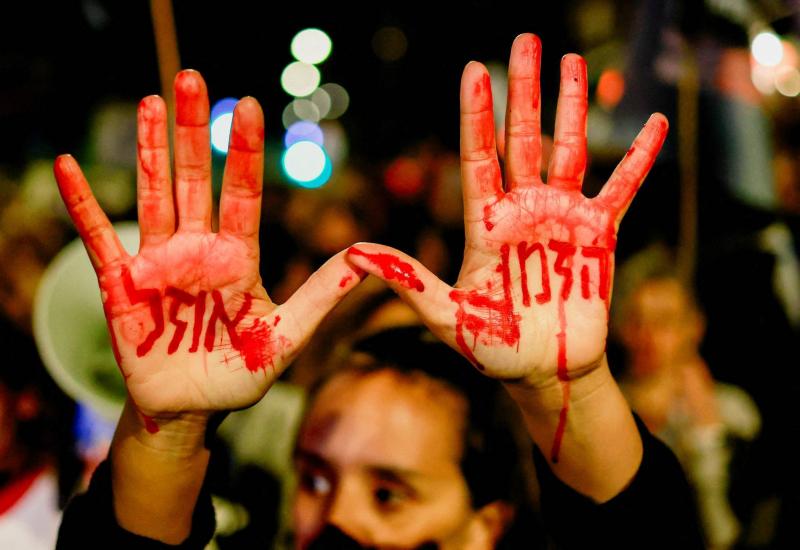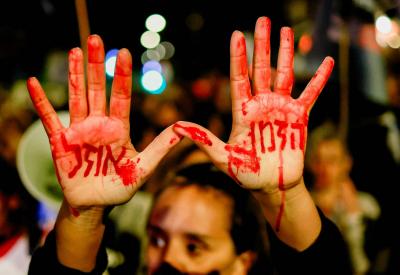After more than 100 days of Israel's efforts to destroy Hamas, Prime Minister Benjamin Netanyahu is facing challenges from war cabinet members regarding strategy while being pressured by Washington regarding post-war plans in Gaza. He finds himself cornered by right-wing ministers in the government. On Thursday, two hours before a prime-time interview aired with a government minister and former military leader increasingly criticizing him, Netanyahu summoned reporters to state that his resolve would not waver until Hamas is eliminated.
This display of resilience and fighting spirit from Netanyahu comes to appease those in Israel whose voices are growing louder, insisting that the goals of destroying Hamas and liberating the hostages still held by the dominant Palestinian movement in Gaza cannot coexist, and therefore a ceasefire is necessary. In the televised press conference, Netanyahu stated, "Some claim that victory is impossible. I completely reject this. Israel, under my leadership, will not settle for anything less than complete victory over Hamas."
Netanyahu, whose political survival is at risk, also faces demands from his coalition partners on the right to adhere to a hardline approach, with some threatening to topple the government if he shifts his positions. Nearly four months into the war, it is still believed that high-ranking Hamas leaders are hiding deep within the extensive tunnel network beneath Gaza.
In a poll conducted by researchers at the Hebrew University on January 14, half of those surveyed said the top priority should be to free the hostages, whose lives are increasingly feared to be in danger after nearly four months since the October 7 attack that resulted in around 1,200 deaths. Over 100 out of 253 hostages were released during a week-long ceasefire in November, but no others have been freed alive since then.
**Negotiation Maze**
A member of the war cabinet clearly and publicly articulated this urgent necessity for the first time. An intensive diplomatic activity involving mediators from Doha, Cairo, and Washington also hints at a renewed focus in back-channel negotiations for a ceasefire. Gadi Eizenkot, a current government minister and former chief of staff of the Israeli army, expressed his concerns on the day Netanyahu spoke. Eizenkot told Channel 12’s "Ovda" program in a pre-recorded interview, "I believe it is impossible to bring the hostages back alive in the near future without an agreement."
**War Strategy**
The war strategy is determined by a trio consisting of Netanyahu, Defense Minister Yoav Galant, and Benny Gantz, the centrist opposition politician leading the Blue and White party to which Eizenkot belongs, who joined the emergency government shortly after Hamas's attack. The three are authorized to vote on the war, with Eizenkot and Ron Dermer, a close Netanyahu ally, overseeing the war cabinet.
Data released by the three after nearly 100 days of the attack show minor differences in their approaches to the conflict. Gantz stated that the priority of rescuing the hostages should take precedence over other military objectives, with his office refusing to provide further details due to the "sensitivity" of the issue. Galant confirmed that Israel's goals cannot be achieved without military pressure but also urged the cabinet to set diplomatic objectives and discuss post-war plans for Gaza, adding that a lack of political resolution in the post-war plan could hinder military progress.
On Monday, the Israeli army suffered its highest casualties in one attack with 24 dead, including 21 in a rocket strike and an explosion in central Gaza, and three in other locations. In the latest weekly poll conducted by the Hebrew University, which included 1,373 Jewish adults in Israel, 42% said an agreement should be reached for the release of hostages, even if it involves freeing imprisoned Palestinians linked to deadly attacks. Seventeen percent said the agreement might slow down the pace of Israel's military response. Combined results indicate that 59% support both measures, an increase from 39% who supported this on October 9.
**Zero-Sum Game**
Nimrod Nir, a researcher involved in the poll, stated that public sentiment is increasingly viewing the situation as a zero-sum game. He added, "Either we free the hostages, which means we have to finish the heavy lifting in the operation (in Gaza), or we continue fighting, although this will cost us (the lives of) the hostages." On Saturday, relatives of the hostages camped out in tents in front of Netanyahu's home, and early in the week, protests took place demanding increased efforts for the hostages' release. At the beginning of the week, protesters also called for early elections. On Monday, relatives of the hostages stormed a parliamentary committee session in Jerusalem.
**Walking a Tightrope**
Netanyahu is already walking a diplomatic tightrope between Washington and the right-wing coalition government and is likely to face more challenges as the phase of the most intense fighting comes to an end. U.S. Secretary of State Antony Blinken stated that Israel's Arab and Muslim neighbors may be ready for full integration of Israel into the region but also need to see a commitment to a path leading to the establishment of a Palestinian state. However, high-level Israeli discussions about who will govern Gaza post-war have been postponed multiple times amid internal political discord.
An informed official revealed that the war cabinet had originally set a date for a session, but pressure from Netanyahu's right-wing coalition partners resulted in the session being referred for discussion in the expanded security cabinet. National Security Minister Itamar Ben Gvir has intensified his rhetoric in recent weeks against the war cabinet. In a message to Netanyahu last week, he warned that the government would be lenient towards Hamas in Gaza and that he would not be a pliant tool agreeing to policies he disagrees with. He indicated that his party, the Jewish Power led by him, might withdraw from the government coalition, a step that could push towards early elections. He told reporters in the Knesset on Monday that if the war ends prematurely, "there will be no government."




